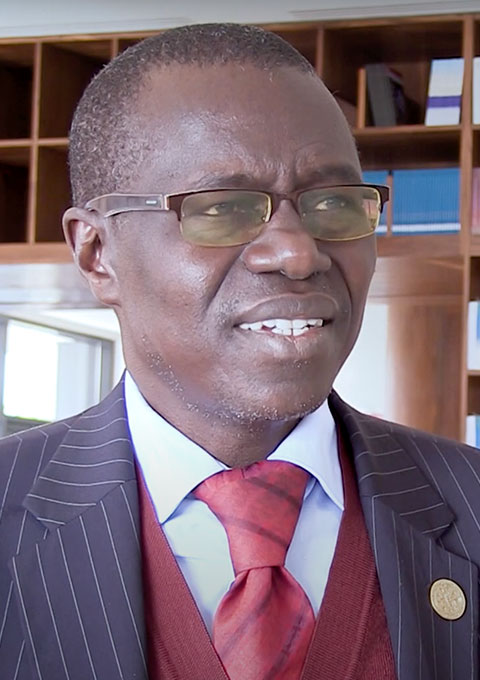Events
52nd Session of the Economic Commission for Africa, Conference of African Ministers of Finance, Planning and Economic Development
SIDE EVENT ON
"Planning for tomorrow’s workforce: is Africa ready? "
Orangeraie, Palmeraie Golf Palace, Marrakech, Morocco
Jointly organized by the secretariat of the Economic Commission for Africa, its Subregional Office for North Africa, African Institute for Economic Development and Planning, Policy Center for the New South, and the High Commission for Planning of Morocco.
Background
The future of work and skills shift are gaining increased attention at international, regional and national levels. Globalization, technological breakthrough, demography and climate change are having a profound impact on labour markets, affecting the quantity and quality of future jobs. Africa cannot afford to miss (and does not need to miss) these technologically driven transformational opportunities, because the population of Africa is younger than that of any other region globally. About 60 per cent of the population in Africa is under 25 years of age and an estimated 10 to 15 million young people join the labour market every year. Accordingly, the continent has a demographic dividend that can propel and sustain its transformation. To capitalize on that fact, there must be both an adequate enabling environment and visionary leaders at all levels, not only in politics. Africa needs leaders who will support excellence in training and education in order to respond to evolving future labour market requirements; empower the confident and curious young generation ready to compete globally and create a whole new economic ecosystem; and embrace change and think exponentially. There is an urgent need to reorganize the education and training systems to keep up with the new demands of the labour markets that are continually challenged by technological disruption, demographic change, shifting business models and the evolving nature of work.
Objective
The main objective of this dialogue is to provide a platform for critical thinking on the relevance of African education and training systems in an evolving, digital and knowledge-based economy, and to encourage exchanges of views from different outlooks and opportunities for Africa to respond to the future of work.
Expected outcomes
- Increased awareness about the skills mismatch across society and the economy and the provision of a platform for multi-stakeholder collaboration to close the skills gap and prepare for the future of work;
- Identification of policy, research, and best practices and ways to improve interdisciplinary action on skills mismatch and skills for decent work and entrepreneurship;
- Focused proposals and innovative strategies for planning for the future workforce with support from the African Institute for Economic Development and Planning.
Target audience
• Government officials;
• Worker and employer organizations;
• International organizations;
• Researchers from academia and think tanks;
• The private sector;
• Civil society organizations;
• Participants of the Conference of Ministers who are involved in planning for future jobs.
For further information, please contact:
Mustapha Sadni Jallab
Head of Training and Research
Department African Institute for Economic Development and Planning and the Economic Commission for Africa
Email: sadnijallab@un.org
Tel.: +221 33 829 5510
Tayeb Ghazi
Economist
Policy Center for the New South
Email: tayeb.ghazi@ocppc.ma
Tel.: +212 67 180 0298
Agenda
| 09:00 – 09:10 |
WELCOME REMARKS Karima BOUNEMRA BEN SOLTANE, Director - IDEP |
| 09:00 – 11:00 |
Globalization, technological breakthrough, demography and climate change are having a profound impact on labor markets, thus affecting both the quantity and quality of future jobs. Africa cannot afford, nor does it have to, miss these technological driven transformational opportunities; as the world’s youngest region today with about 60% of its population under the age of 25 and an estimated 10 to 15 million young people joining Africa’s labor market every year, the continent has a demographic dividend that can propel and sustain its transformation. The main objective of this dialogue is to provide a platform for critical thinking on the relevance of African education and training systems in an evolving, digital and knowledge-based economy and to encourage exchanges of views from different outlooks and opportunities for Africa to respond to the future of work. Moderator Panelists: Karima BOUNEMRA BEN SOLTANE, Director - IDEP Karim EL AYNAOUI, President – Policy Center for the New South Ayache KELLAF, Director of Forecasting and Foresight – HCP Yonov FREDERICK AGAH, Deputy Director-General – WTO Victor DJEMBA, Africa Director – UNIDO Lilia NAAS HACHEM, Director of the Economic Commission for Africa Office in North Africa – CEA Moubarack LO, Senior fellow at the Policy Center for the New South and Special Adviser to the Prime Minister in Senegal, Chief Economist of the Prime Minister and Coordinator of the Economic and Social Analysis Unit Francois PAUL YATTA, Director of CGLU Africa Programmes – CGLU Peter VAN ROOIJ, Deputy Regional Director for Africa, International Labour Organization (ILO) |










